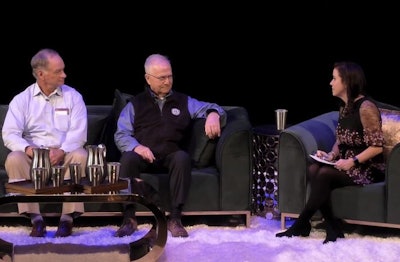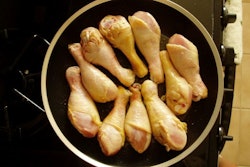
When Perdue Farms revealed it would acquire Niman Ranch in 2015, many people had questions.
One thing people questioned was why the fourth largest broiler producer in the United States would acquire a smaller, vision-oriented pork company with a special emphasis on raising pigs without antibiotics, artificial growth stimulants with a focus on sustainability.
But the skeptics have been quieted, Perdue Farms Chairman Jim Perdue and Niman Ranch Founder Paul Willis said on November 1, while speaking at the Food Tank Summit in New York City. Both men said the two companies had more similarities than many thought.
Why Perdue got involved in pork production
“Our vision as a company was to be the most trusted name in premium protein, so it doesn’t say chicken,” said Perdue.
Perdue already had a small presence in the pork industry when it acquired the Coleman Natural brand in 2011. Coleman Natural initially interested Perdue because it was interested in the organic chicken business, but along with chicken, Coleman Natural also offered pork. Perdue said the pork business was “growing by leaps and bounds,” which set the stage for the acquisition of Niman Ranch.
The history of Niman Ranch
Willis said Niman Ranch grew “from nothing to something pretty significant.”
What started as one pork operation grew from a network of about 600 farms. As it grew, Niman Ranch changed ownership several times, and he knew that one more change of ownership was “somewhat inevitable.”
While Willis said he was not involved in the actual negotiations, Perdue seemed to be more attractive than some of the alternatives.
“There were other potential buyers of Niman Ranch that I really wouldn’t have been happy about,” said Willis. “What I really came to find out was Perdue is a family-owned business. That’s different than a publicly traded company.
“It makes a great deal of difference. It’s not just bottom-line driven, but you can have the things you were founded on, and you can continue with that.”
Perdue said shortly after the acquisition was finalized, Willis invited him to a farmer appreciation dinner in Des Moines. He admitted he was rather intimidated at first to appear with about 600 skeptical farmers. But he got up and spoke anyway, and told about Perdue’s long heritage as a family business.
“Afterwards, one of the farmers came up to me and said, ‘Mr. Perdue, I liked what you said and we’re going to give you a chance.’ I said, ‘Well, I can’t ask for more than that,’” Perdue said.
Perdue learns from Niman Ranch
Perdue knew Niman Ranch was a successful business, and Perdue Farms didn’t want to mess up a good thing.
“I think there’s too much in the U.S. when a company merges with another company, and they make it like them, and often times destroy it,” Perdue explained. “There’s a formula that makes a company successful of cultures and values, and you’ve got to let those stay in place. I think it so happens their values and our values are so entwined, so that’s not much of an issue. … They’re successful for some reason. Why Perdue-ize them?”
While Perdue Farms was the bigger business, Perdue acknowledged that it was the bigger company that learned the most. Perdue can help Niman Ranch by providing capital and helping them build new facilities and grow, but Niman Ranch helped Perdue realize the importance of putting more emphasis on the farms and the animals.
Perdue said he and the company grew to appreciate Niman Ranch’s philosophy about producing a better product, and the way the animals are treated affects the quality of the product.
“We’d been focused more as a traditional poultry company on the end products that see in the store, not so much what’s happening on the farm, not so much on the farmers. Of course, it became very obvious they are totally focused on the farm and the farmers,” said Perdue.
Perdue said the farms and the care of the animals were of a heavy focus during its earlier days. Perdue has in a sense returned to its roots with a philosophy of producing a better tasting product by how the animals are raised. That has involved reducing anxiety and stress, and encouraging activity. The company is now footing the bill to convert all grower houses to have windows. It is also adding enhancements to the houses.
“We’re finding already that they’re healthier,” Perdue said.
Will other poultry companies follow Perdue’s lead?
Perdue was asked how other poultry companies have responded to its increased focus on animal welfare, and even collaborating with animal welfare groups that have been adversarial to the industry.
Perdue compare that to its conversion to having all chicken products that bear the Perdue name coming from birds that were raised without antibiotics (RWA). That was a 12-year-process, and when the change was made, it was a tipping point. Since then, other companies have followed in the RWA trend.
“I think the same thing can happen on welfare, that if we can prove that this is a winning model, that this can happen,” Perdue said.
















